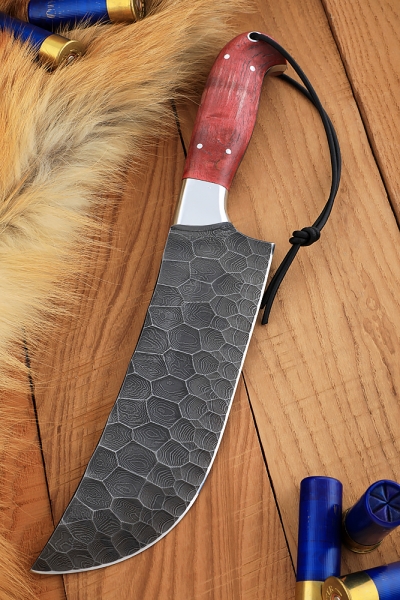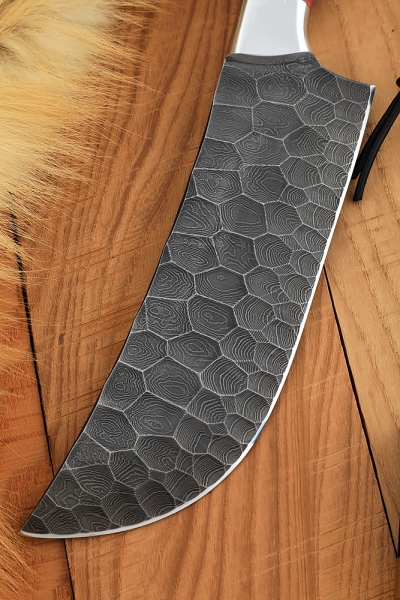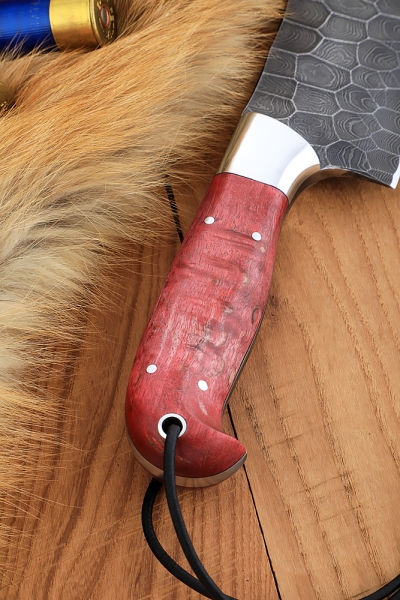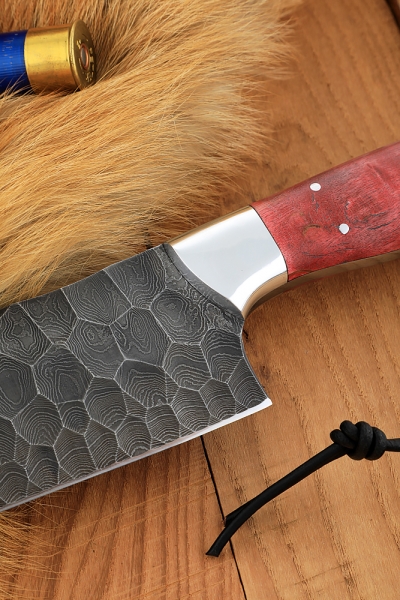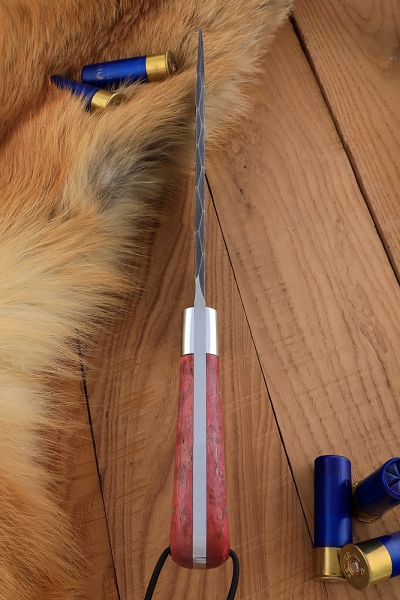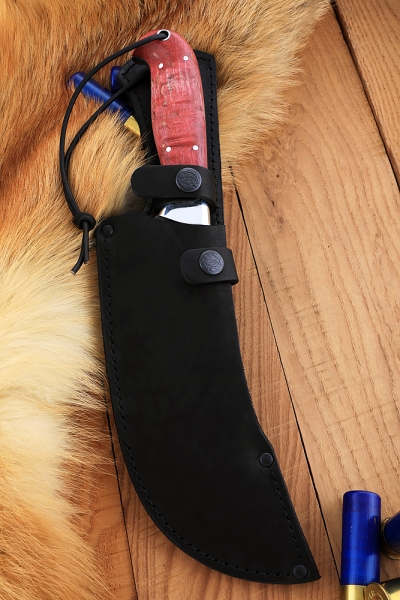Meat knife
Meat knife
- Blade steel tipeDamascus
- Lengtn blade (os)190 mm
- Witdth blade (os)55 mm
- Толщина клинка5 mm
- Lengtn handle (os) 125 mm
- Hardness (HRC)62
- SheathLeather
- Product weight, gram540
- КонструкцияФиксированные
Detailed analysis of the properties and features of the knife
Blade steel: Damascus steel, hardness 62 HRC
The blade is made of premium Damascus steel with a hardness of 62 HRC, which is one of the best options for handmade meat knives. Damascus steel is famous for its unique layer pattern, exceptional strength and cutting edge durability. A hardness of 62 HRC guarantees long-term sharpness, reducing the frequency of sharpening even during intensive work, and high strength allows you to work with thick meat and cartilage without the risk of deformation of the blade. However, such hardness requires care: it is not recommended to use a knife on bones or frozen foods — the risk of chipping is higher than that of softer steels.
Dimensions and shape of the blade
The blade is 190 mm long and 5 mm thick, which is an impressive reserve for slicing large pieces of meat, removing fillets from bones and butchering. The 55 mm width makes it possible to conveniently pry and transfer slices, as well as use the tip for filigree work. This geometry perfectly copes with cutting large pieces, allows you to quickly process carcasses and remove the skin.
Handle material and ergonomics
(The vector storage does not contain data on the material and color of the handle.)
However, the length of 125 mm is suitable for a secure grip with a medium and large palm. Thanks to its massive blade and well-thought-out shape, the knife will fit perfectly in your hand, providing confident control even when working with heavy meat. The leather sheath allows you to safely store the knife and take it with you on trips, protecting both the blade and the user.
Wear resistance, corrosion protection and maintenance
Damascus steel is resistant to wear due to its high hardness and multiple layers, but requires attention to possible moisture and acid corrosion. Damascus blades are recommended to be thoroughly wiped dry after use, to avoid prolonged contact with moisture and aggressive environments. Regular treatment of the blade with a thin layer of oil is recommended. Sharpening should be handled carefully — use only suitable tools (water stones) so as not to damage the unique pattern and geometry.
Optimal application area
The knife is specially designed for cutting meat: it perfectly copes with cutting large pieces, skinning, separating fillets and working with joints. Ideal for hunting, professional cuisine, barbecue enthusiasts, private farm owners and gourmets who appreciate handmade aesthetics.
Advantages and limitations
Advantages:
- Long-term sharpness due to the high hardness of Damascus steel (62 HRC).
- The aesthetic appearance is a unique handmade blade pattern.
- The thick and wide blade handles massive chunks of meat and makes it easier to transfer sliced slices. Good wear resistance and edge strength — the knife does not require frequent sharpening.
- Reliable leather scabbard for safe transportation and storage.
- It is not recommended to use it for chopping bones, frozen foods, or as a hatchet — high-hardness steel can chip.
- It requires careful care — be sure to wipe dry, avoid moisture and periodically lubricate with oil.
- It is not suitable for thin, delicate slicing of vegetables, bread or fish — the geometry and mass of the blade are focused specifically on meat.
Unique moments and historical heritage
Handmade from Damascus steel, this knife combines modern technology and centuries—old traditions of blacksmithing - Damascus has always been considered an elite material among craftsmen and collectors. Each piece has its own unique blade pattern, which turns the knife into a personal and status accessory.
Conclusion and recommendations
If you are looking for a powerful, reliable and expressive knife for working with meat — whether it is home cooking, private farming, hunting or professional level — this model will be your best choice. For collectors and connoisseurs of handmade, a Damascus steel knife with a unique pattern will be a worthy addition to the collection.
Care recommendation: After each operation, thoroughly clean and wipe the knife dry, avoid prolonged contact with moisture, store in dry conditions, and regularly treat the blade with oil. Use water stones for sharpening, do not use aggressive abrasives.
It is not recommended for those who need a universal kitchen knife or a tool for rough chopping — this model opens up the maximum possibilities when working with meat and requires careful care.







